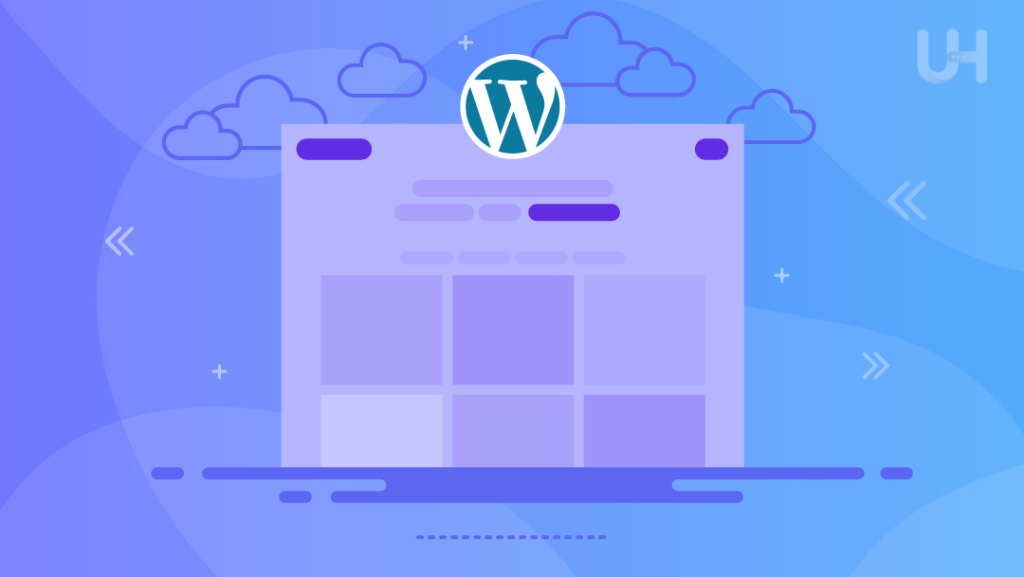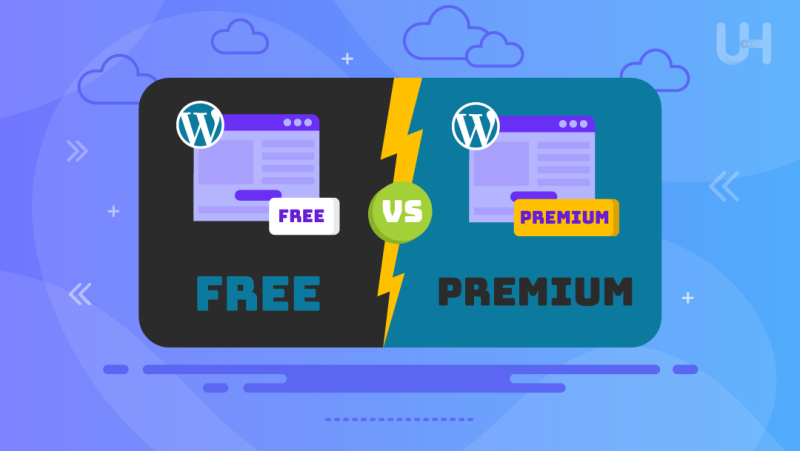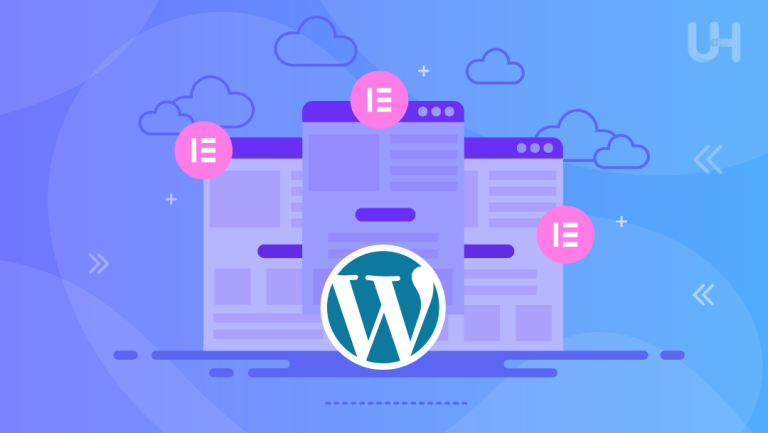Free and premium WordPress themes both have their benefits, but understanding their differences is crucial to making the right choice that would suit your business’s needs and goals. WordPress themes are crucial to a WordPress website because they indicate how a site looks and performs. From the overall general layout to minute design points, themes have much play in shaping the user’s experience. A well-chosen theme can make a website look prettier, user-friendly, and functional. It would also make the website faster in performance and speed, bringing about a smoother experience for those who visit the website. When selecting a theme, it’s important to consider not just its appearance but also its features, as these can directly impact your site’s effectiveness in achieving business goals.
There are two primary types of WordPress themes: free and premium WordPress themes. Free themes, as the name suggests, are available at no cost. They are often simple and offer basic customization options, making them suitable for small websites or personal projects. However, free themes may not be as feature-rich as premium themes, and often, there is limited support and updates. Premium themes, on the other hand, come with a much more comprehensive feature set, flexibility, and dedicated developer support. Typically, these themes come with pre-installed tools for improved functionality, design options, and security. In this blog, we’ll be detailing the differences between free and premium themes in depth to help you choose the one that suits your business’s needs and budget best.
What Are WordPress Themes?
WordPress themes are pre-designed templates that define how your site looks and works. They govern and control the layout, color schemes, typographies, and general presentation elements. Themes make it pretty easy to create a professional website without having to write code. As such, they offer structural and visual appeal to your site.
Themes also control how the content is displayed. They govern where your text, images, and videos are located on your pages. Another thing that most themes contain is built-in features like custom widgets, navigation menus, and responsive design that ensures your site looks fine on mobile devices. To cut it short, themes are very important to make your website look beautiful and user-friendly.
Themes vs Plugins: What’s the Difference?
While themes take up the look and format of your website, plugins give function. Themes are all about designs, while plugins have in mind adding features to extend your site’s functionalities. For example, you would determine how your home page looks with a theme. However, a plugin allows you to add a contact form, social sharing button, or even add eCommerce functionality.
Thematics and plugins are the same but represent different things. Themes and plugins are necessary components to build a fully functional website. Themes give your site its visual identity, whereas plugins allow you to customize and extend your site’s functionality. Without a plugin, your site could be beautiful but lack an important feature. On the other hand, without a good theme, your website could have fantastic functionality but will fail to attract people due to its design. Thus, both must be chosen wisely to create an all-rounded effective website.
Exploring Free WordPress Themes
Free WordPress themes are so popular that many businesses and individuals choose them as a low-cost, simple way to put up a website.
What are Free WordPress Themes?
Free WordPress themes offer the foundation and design of a website. They usually come with standard features, such as pre-built page layouts, color options, and some level of customization settings. They can also include a few of the essential tools, such as custom headers, footers, and widget areas. However, they will usually not have as much flexibility as premium themes and offer fewer options for deep customization.
While free themes are easy to install and use, perhaps they lack some of the premium features that complex websites are going to need. They might not have built-in SEO optimization tools or not be integrated with advanced page builders. Free themes may sometimes not receive updates as that of the premium ones, in turn, affecting their functionality or security over time, but they are often found suitable for simple websites of lesser requirements.
Most Popular Free WordPress Themes
Some of the most used free WordPress themes by businesses are very simple and efficient. Here are some of them:
- Astra: Astra is a very lightweight theme that is also very customizable. It makes it one of the great options for business websites, with many pre-built templates and compatibility with many page builders.
- OceanWP: OceanWP is another versatile theme known for its flexibility. It supports eCommerce features, responsive design, and many customization options.
- Neve: Neve is fast and easy to use, designed for small businesses and personal websites. It’s mobile-friendly and works well with popular page builders like Elementor.
- GeneratePress: This theme focuses on performance and simplicity. It’s ideal for businesses that need a fast-loading website with a clean, professional design.
These are sound choices for businesses that only want a little functionality but which don’t need heavy features. The themes are minimalistic, elegant, powerful, customizable, and compatible with all top-rated WP enterprise hosting plans.
Build Your WordPress Website on a Secure Foundation
Unlock the full potential of your WordPress site with fast, secure hosting and excellent support from Ultahost. Choose the perfect theme for your business and host it on a secure, high-performance platform.
Best Scenarios to Use Free WordPress Themes
Free WordPress themes will mostly work for small sites requiring simpler needs. These would include the following best-scenario cases:
- Simple Blogs: Perfect for personal blogs or websites that don’t necessarily need complex features. They still allow enough design flexibility to give a blog an attractive look without any clutter.
- Personal Websites: For people who simply want to showcase their portfolio or their brand, free themes are enough for a site without breaking the bank.
- Small Startups: Small businesses or startups using Low-cost WordPress Hosting with fewer resources can utilize free themes as a way to get online at no cost. Free themes help small startups develop a fully functional website while keeping the costs low.
- Non-Profit Organizations: Non-profit Organizations can use free themes to build their websites without having to spend a lot of money, thereby allocating the resources elsewhere.
In these cases, free themes offer enough functionality to create a clean and professional website while keeping costs minimal. However, if your business grows and requires more advanced features, upgrading to a premium theme might become necessary.
Premium WordPress themes offer a wide range of features that can greatly enhance the design and functionality of your website.
Premium WordPress themes provide much more than the basics. They come with advanced features that give you greater flexibility and control over your website’s design and functionality. These themes often include multiple pre-built demo templates, which can be imported and customized with ease. Premium themes usually offer a wider range of customization options, allowing you to tweak fonts, colors, layouts, and more.
In addition, premium themes typically come with more advanced tools such as drag-and-drop WP page builders, custom widgets, and built-in SEO features. They often include regular updates and security patches to ensure that your site stays up to date. Furthermore, premium themes often provide dedicated customer support, helping you resolve any issues or questions quickly. These added features make premium themes ideal for businesses that need more than a basic website.
Several premium themes stand out for their quality and versatility. Here are some of the top options to consider:
- Divi: Divi is one of the most popular premium themes for WordPress. It includes a powerful drag-and-drop page builder, allowing you to create any layout you want without needing to code. Divi also offers a vast library of pre-designed templates, making it easy to build a beautiful website quickly.
- Avada: Avada is a flexible, multipurpose theme that works well for any type of business. It includes various demo sites that you can import with one click, making setup simple. Avada also comes with a range of advanced customization options and is known for its high performance.
- Elementor Pro: Elementor Pro is a page builder plugin that pairs perfectly with many premium themes. It offers a visual editor and powerful design tools that allow you to create custom layouts and unique designs. While it works with free themes, combining it with a premium theme enhances its capabilities.
- StudioPress: Known for its clean, SEO-friendly design, StudioPress offers a range of premium themes that are perfect for businesses looking to optimize their websites for search engines. Their themes are fast, secure, and highly customizable.
These themes provide excellent options for businesses that need advanced features and greater control over their website’s design. plans help you save money without sacrificing user experience.
Premium WordPress themes are ideal for businesses and websites that require more advanced features and functionality. Here are some scenarios where premium themes are the best fit:
- Large eCommerce Websites: For online stores, premium themes offer essential features like built-in shopping cart functionality, product filters, and advanced payment gateway integrations. Premium themes are designed to support high-traffic eCommerce sites, providing better performance and scalability.
- Corporate Blogs: Businesses with corporate blogs need a professional, polished look. Premium themes can offer advanced customization options, allowing you to create a site that aligns with your brand identity. They also often include tools for managing large amounts of content, such as post grids and customizable archives.
- Membership or Subscription Sites: Websites offering paid memberships or subscription services benefit from premium themes. These themes often include built-in membership features or compatibility with popular plugins for managing subscriptions and user access.
- Portfolio Websites: Premium themes are perfect for businesses or individuals showcasing their work, as they offer sleek, modern designs and customizable layouts that allow for easy presentation of portfolios.
- Multilingual or Global Websites: If your business operates internationally, premium themes often support translation plugins and are optimized for multilingual websites, making them an excellent choice for global businesses.
Free WordPress Themes – Pros and Cons
Free WordPress themes are a cost-effective solution for building websites, but they come with both advantages and limitations. Here’s a detailed breakdown:
Advantages of Free WordPress Themes
- Cost-effective: Free themes come at no cost, making them ideal for businesses or individuals on a tight budget.
- Variety: A wide range of free themes are available, offering different designs suited for blogs, portfolios, and simple websites.
- Ease of Use: Free themes are generally easy to install and customize, even for beginners with no coding knowledge.
- Quick Setup: Free themes offer basic features such as responsive design and customizable color schemes, allowing for fast website creation.
- Basic Customization: Some free themes come with basic tools for adjusting the layout, fonts, and colors, providing flexibility within their limitations.
Limitations of Free WordPress Themes
- Lack of Advanced Features: Free themes generally don’t offer advanced functionalities like built-in page builders, eCommerce tools, or SEO features.
- Limited Support: Free themes often come with no direct customer support, leaving users to rely on community forums or external resources for help.
- Security Risks: Free themes may not receive regular updates, which could expose your site to security vulnerabilities.
- Limited Customization: The design options in free themes can be restrictive, offering fewer layout and style choices compared to premium alternatives.
- Potential Performance Issues: Some free themes are not optimized for speed, which could affect your website’s load time and overall performance.

Premium WordPress themes offer numerous benefits but also come with some drawbacks. Here’s a breakdown of their advantages and limitations:
- Professional Design: Premium themes offer high-quality, polished designs that make your website look professional and stand out.
- Advanced Functionality: These themes come with advanced features like custom page builders, eCommerce support, and built-in SEO tools.
- Ongoing Support: Premium themes provide dedicated customer support, ensuring quick assistance whenever you face any issues.
- Regular Updates: Premium themes are regularly updated, ensuring your site stays secure and compatible with the latest WordPress versions.
- Greater Customization: Premium themes offer more options for customization, allowing you to create a unique website that aligns with your brand.
- Cost: Premium themes come with a price, which may be a barrier for businesses with limited budgets.
- Complexity: With advanced features, premium themes can be more complex to use, requiring some learning and time to master.
- Feature Overload: Some premium themes offer too many features, which may overwhelm users and result in a cluttered or slow website.
- Potential Bloat: Premium themes often come with numerous options and add-ons that can make your site’s performance slower if not carefully managed.
When choosing between free and premium WordPress themes, it’s important to consider several key differences.
Customization Options
Free Themes: Free WordPress themes offer basic customization options. These typically include limited control over colors, fonts, and layout. While you can tweak some aspects, the customization is often restricted, which can make it difficult to create a unique, branded website.
Premium Themes: Premium themes provide a wider range of customization options. They often include advanced theme settings, drag-and-drop page builders, and detailed control over retro fonts, colors, layouts, and content. This allows for a more personalized design and flexibility in making changes without the need for coding.
Difference: The main difference lies in the level of control. Free themes offer basic features for users with simpler needs, while premium themes give more freedom to those who need advanced, unique designs.
Performance and Speed
Free Themes: Free themes can sometimes be slower due to less optimization and fewer built-in performance enhancements. Some free themes may not be coded as efficiently, which could impact your website’s load time and overall performance.
Premium Themes: Premium themes are often better optimized for speed and performance. They typically offer faster load times due to clean code, fewer unnecessary features, and regular updates. Some premium themes also come with performance optimization tools built-in.
Difference: Premium themes are usually better optimized for speed and performance, making them a better choice for high-traffic sites. Free themes, while functional, may struggle to deliver the same level of performance, especially as your website grows.
Support and Documentation
Free Themes: Free themes typically rely on community support. You can often find help in online forums or WordPress theme directories, but you may not receive quick or direct assistance. Documentation for free themes is generally minimal, which can make it harder to troubleshoot issues.
Premium Themes: Premium themes come with dedicated customer support. This support is usually available through live chat, email, or ticket systems, ensuring you get quicker responses. Additionally, premium themes tend to have more comprehensive documentation, making it easier to customize and solve problems.
Difference: The major difference is in the level of support. Free themes depend on community-driven forums, while premium themes offer direct, expert support and detailed documentation, ensuring a smoother experience for users.
Boost Your Site’s Performance with WordPress Hosting!
To ensure optimal performance and security for your site, you need reliable hosting. Transform your website with the perfect WordPress theme and reliable hosting. Experience fast, secure, and easy WordPress hosting with Ultahost. Get started now!
Security and Updates
Free Themes: Free themes may not receive regular updates or security patches. This can expose your website to vulnerabilities over time. If a free theme is not updated regularly, it may become incompatible with newer WordPress versions, posing security risks.
Premium Themes: Premium themes come with regular updates and security patches. Theme developers provide ongoing maintenance, ensuring that the theme stays compatible with the latest WordPress updates and is secure from vulnerabilities.
Difference: Premium themes are more likely to stay updated and secure, protecting against potential risks. Free themes may not receive the same attention, which can make your site more vulnerable if the theme is neglected.

When comparing free and premium WordPress themes, businesses must consider both the upfront costs and the long-term value. Each option has its pros and cons, and understanding how they measure up in terms of cost-effectiveness and overall value can help you make an informed decision.
Upfront Costs and Long-Term Investment
Free WordPress themes come with no initial cost. This makes them an appealing option for businesses with limited budgets or those just starting. You can quickly get a website up and running without any financial commitment. However, while free themes allow for immediate savings, they might not offer the advanced features or flexibility you’ll need as your business grows.
Premium themes, on the other hand, come with an upfront cost, usually ranging between $30 and $100 per year. While this represents an investment, it often pays off in the long run. Premium themes typically include a wider range of features, such as advanced customization options, better performance, and built-in tools like SEO features or page builders. This means you can avoid the need to purchase additional plugins or hire a developer, potentially saving more money down the road. In this way, although the initial expense is higher, premium themes can provide better value over time.
Assessing Value for Money
When assessing value for money, free themes offer limited features. While they are great for small, simple websites, free themes usually lack advanced customization options, performance enhancements, and dedicated support. Businesses may find themselves limited as they try to expand or improve their websites. If your website needs more functionality, free themes might not provide the necessary tools, which could result in higher costs in the future as you try to add features or resolve issues on your own.
Premium themes, however, provide much greater value. They typically come with extensive features, such as customizable layouts, SEO optimization tools, and more powerful design options. Moreover, premium themes come with dedicated support, which can be a huge time-saver for businesses that encounter issues. By paying for a premium theme, you gain access to a more robust solution that can support your business’s growth and reduce potential costs related to fixing issues or hiring experts.
How to Choose the Right Theme for Your Business Website
Choosing the right free and premium WordPress themes for your business website is crucial for creating an online presence that reflects your brand, engages visitors, and supports your goals.
Identifying Your Business Needs
Before selecting a theme, it’s important to understand your business goals and how they relate to your website. Are you looking to build an online store or showcase your portfolio? Identifying these goals will help you choose a theme that aligns with your objectives. For example, an eCommerce website will need a theme that supports product catalogs, shopping carts, and payment systems, while a portfolio site may need a theme focused on visual design and high-quality image display. Understanding the purpose of your website will guide you toward a theme that offers the right layout, functionality, and customization options to meet those needs.
Budgeting for Your Website Design
Once you have a clear understanding of your business needs, it’s time to set a budget for your website design. The cost of a theme can vary, with free themes being available at no cost, and premium themes ranging from $30 to $100 per year. Consider how much you’re willing to invest in the look and functionality of your website. If you’re just starting or have a limited budget, a free theme might be a good place to begin. However, if you need advanced features, better support, and a professional design, investing in a premium theme could be worth the cost. Keep in mind that your theme is only one part of the overall website design budget, so plan for additional expenses like plugins, hosting, and professional services if needed.
Evaluating Required Features
When choosing a free and premium WordPress themes for your business website, it’s essential to evaluate the key features that will ensure your site’s success. Some features to consider include:
- SEO Tools: Look for themes with built-in SEO features or compatibility with popular SEO plugins. This helps improve your website’s visibility in search engines and drives more traffic to your site.
- Mobile Responsiveness: With a growing number of people browsing websites on mobile devices, it’s crucial to choose a theme that is mobile-friendly. A responsive theme ensures your website looks great on all screen sizes, providing a better user experience.
- Page Builders: If you need to customize your site’s design without coding, look for themes that support drag-and-drop page builders like Elementor or WPBakery. These tools make it easy to create custom pages and layouts.
- Speed Optimization: A theme that’s optimized for speed is essential to ensure fast load times and improve the user experience. Faster websites typically have lower bounce rates and higher conversion rates.
- Security Features: A secure website is vital for protecting your business and users’ data. Look for themes that are regularly updated and have security features in place.
By prioritizing these features, you can narrow down your options and select a theme that supports your business goals and enhances your website’s performance.
Conclusion
Free and premium WordPress themes have their benefits and drawbacks. Free themes are budget-friendly and easy to use but may lack advanced features, support, and security. Premium themes, on the other hand, offer professional designs, better functionality, and dedicated support, but they come with a cost. Depending on your business’s needs, goals, and budget, you should choose the option that best aligns with your long-term plans. It’s important to assess your current website requirements and consider future growth before making a decision. By doing so, you can select the theme that will help your business succeed online.
To ensure fast, reliable, and secure performance for your website, choose Ultahost’s Fast WordPress Hosting plan. Ultimately, the theme you choose for your WordPress site plays a crucial role in its success.
FAQ
What is the main difference between free and premium WordPress themes?
Free themes cost nothing but offer basic features, while premium themes require payment and include advanced tools, support, and customization.
Are free WordPress themes safe to use?
Yes, free themes from the WordPress directory are safe, but they may lack frequent updates and advanced security features.
Do premium WordPress themes always provide better performance?
Premium themes often deliver better performance due to optimized code, but overloading features can impact speed.
Can I switch from a free theme to a premium one later?
Yes, you can switch themes anytime, but some design and functionality adjustments may be needed.
Are free WordPress themes suitable for business websites?
Free themes are ideal for simple websites, but premium themes work better for businesses requiring advanced features.
Do premium themes include customer support?
Yes, premium themes usually offer dedicated support, which is unavailable with most free themes.
What features should I prioritize when choosing a theme?
Focus on SEO tools, mobile responsiveness, speed, and customization to match your website’s goals.














